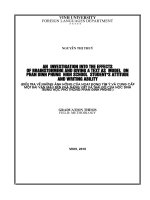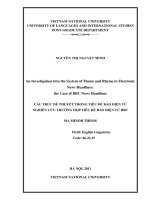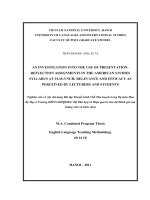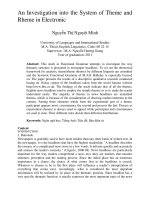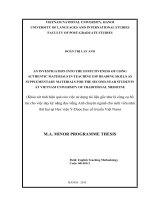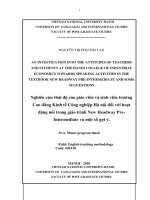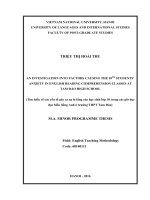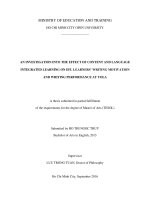An investigation into translation procedures of similes and ellipsis in english translational ver
Bạn đang xem bản rút gọn của tài liệu. Xem và tải ngay bản đầy đủ của tài liệu tại đây (677.05 KB, 26 trang )
THE UNIVERSITY OF DANANG
UNIVERSITY OF FOREIGN LANGUAGE STUDIES
PHẠM THỊ TUYẾT NGÂN
ai
D
aN
D
oc
H
AN INVESTIGATION INTO TRANSLATION PROCEDURES
OF SIMILES AND ELLIPSIS IN ENGLISH
TRANSLATIONAL VERSIONS FROM
THEIR VIETNAMESE SHORT STORIES
g
an
Major: ENGLISH LINGUISTICS
Code: 8220201
MASTER THESIS IN
LINGUISTICS AND CULTURAL STUDIES OF
FOREIGN COUNTRIES
(A SUMMARY)
Da Nang, 2021
The thesis has been completed at University of
Foreign Language Studies, The University of Da Nang
Supervisor: LÊ TẤN THI, Ph.D.
Examiner 1: Assoc.Prof.Dr. Phạm Thị Hồng Nhung
D
Examiner 2: Dr. Ngũ Thiện Hùng
H
ai
g
an
aN
D
oc
The thesis will be orally defended at the Examining Committee
Time: 29th January 2021
Venue: University of Foreign Language Studies - The University of
Da Nang
This thesis is available for purpose of reference at:
- Library of University of Foreign Languages Studies, The
University of Da Nang
- The Center for Learning Information Resources and
Communication – The University of Da Nang
1
Chapter One
INTRODUCTION
1.1. RATIONALE
An anthology of contemporary prose - Love After War titled
in English. It was published by Curbstone, America and released
worldwide through the Internet, then the San Francisco Chronicle
reports voted as one of the 100 best books of 2003. This is the first
time Vietnam's literature introduces himself to the world with the
D
most confident way. In this anthology, we recognize the big names
ai
of contemporary prose from Vietnam. While reading Vietnamese
H
short stories and their English translational equivalents in “Love
oc
After War”, it is noticed that many stylistic devices are used such as
simile, ellipsis etc. They seem to be very effective in bringing
D
miracles to Vietnamese short stories. Due to these rhetorical devices,
aN
the language is peeled off, wearing a new cloak which is more
beautiful, more charming and of course meaningful.
an
In order to create favorable conditions for those who want to
g
understand more about how Vietnamese stylistic devices are
translated into English in the translational version “Love After War”,
I decided to choose the topic entitled “An Investigation into
Translation Procedures of Similes and Ellipsis in English
Translational Versions from Vietnamese Short Stories‟
1.2. AIMS AND OBJECTIVES
1.2.1. Aims
1.2.2. Objectives
2
1.3. RESEARCH QUESTIONS
1. What are procedures for translating simile
in Vietnamese short stories into English in
“Love After War”?
2. What are procedures for translating ellipsis
in Vietnamese short stories into English in
“Love After War”?
3. What are the occurrence frequencies of procedures for
D
translating simile and ellipsis in Vietnamese short stories into
ai
English in “Love After War”.
H
1.4. SCOPE OF STUDY
D
oc
1.5. SIGNIFICANCE OF THE STUDY
Chapter Two
aN
LITERARURE REVIEW AND
THEORETICAL BACK GROUND
g
an
2.1. PREVIOUS STUDIES
In Vietnamese as well as in English language, some
researches on stylistic devices and translation of stylistic devices
include “ 99 phương tiện và biện pháp tu từ tiếng Việt” by Đinh
Trọng Lạc (1996), “ Stylistics” by Galperin, I. R. (1977), “A Text
book of translation ” by Newmark, P. (1988). In reference with the
dissertations, some theses related to the research are referred to.
All of these studies could be used as the valuable reference
for my research. However, there has been so far no research into the
3
stylistic devices, i.e. simile and ellipsis used in Vietnamese short
stories and their English translational equivalents in “Love After
War”. This is the reason why I have decided on the research.
2.2. THEORETICAL BACKGROUND
2.2.1. Stylistic Devices
Stylistics studies the special media of language which are
called stylistic devices and expressive means. Expressive means and
stylistic devices form three large groups of phonetic, lexical,
D
syntactical means and devices. Each group is further subdivided
according to the principle, purpose and function of a mean or a
ai
oc
H
device in an utterance.
2.2.2. Translation procedures
The following are the different translation procedures that
D
are proposed by Newmark (1988b: 83, 114) and the examples are
aN
quoted from Nguyen Thi Hong Ha (2018). They include synonymy,
shifts or transpositions, compensation, reduction, paraphrase,
an
literal, expansion, explanation.
Vietnamese Simile and Ellipsis into English
g
2.2.3. Syntactic Structures related to the Translation of
Like other units of language in both languages, the
translation of simile as well as ellipsis as stylistic devices in
Vietnamese into English can be transformed by means of syntactic
structures. The English structural equivalents of Vietnamese simile
and ellipsis can be a syntactic category or a phrase, such as a noun,
adjective or verb phrases; or a sentence, i.e. simple, complex or
compound in positive, negative or interrogative forms in active or
4
even passive. Thanks to decoding the meaning of English
translational equivalents of Vietnamese simile and ellipsis in such
syntactic constructions, translation procedures can be identified.
2.2.4. Overview of Co-translators and the Book
In these sections, we mention the brief bibliographies of the
co-translators Wayne Karlin and Hồ Anh Thái, the translational
version itself „Love after War‟ and especially opinions of some
authors about the translational version „Love After War‟.
D
Chapter Three
ai
METHODOLOGY AND PROCEDURES
H
oc
3.1. RESEARCH METHODS
In order to reach the goal of the study, we carried out our
D
investigation based on the qualitative and quantitative methods.
aN
The combination of qualitative and quantitative approaches
was applied to collect, classify the data on Vietnamese stylistic
an
devices, i.e. simile and ellipsis in Vietnamese short stories and their
g
English translational equivalents in “Love After War”. And then on
basis of translation theories, we analyzed and pointed out the
translation procedures for rendering these Vietnamese stylistics
devices into English.
3.2. DATA COLLECTION
Among 50 Vietnamese short stories and their English
translational equivalents in “Love After War”, 13 Vietnamese short
stories and their translated versions were chosen at random for our
5
research because they are among the short stories that could be
downloaded from the internet.
In terms of sampling, 86 samples were totally collected from
13 Vietnamese short stories mentioned above and 86 English
translational versions of theirs. Among these samples, there were 35
samples related to the simile in the source language and the same
number in the target language and 51 samples in association with
Vietnamese ellipsis and the equivalent quantity in English
D
translational version.
3.3. DATA ANALYSIS
ai
Data analysis was carried out based on the theories of
H
stylistic devices and the theories of translation. The collected data
oc
were identified and grouped into categories depending on the
D
stylistic devices, i.e. simile and ellipsis found in Vietnamese short
War”.
3.4. RESEARCH PROCEDURES
g
an
aN
stories and their English translational equivalents in “Love After
(i) collecting samples of simile and ellipsis as stylistic
devices in 13 Vietnamese short stories and finding their English
translational equivalents in “Love After War”
(ii) classifying, comparing, analyzing, discussing and finding
the results of simile and ellipsis in the source language as well in the
target one in terms of both quantity and quality and in order to find
the procedures for rending these stylistic devices into English.
6
(iii) giving some suggestion for translating, teaching and
learning
3.5. RELIABILITY AND VALIDITY
On the basis of methodology and procedures, the research
result is significant, highly practical and really valid.
CHAPTER 4
FINDINGS AND DISCUSSION
D
4.1.
TRANSLATION PROCEDURES OF VIETNAMESE
ai
SIMILE INTO ENGLISH
H
4.1.1. Translation Procedures of Vietnamese Simile with
4.1.1.1. Literal
D
oc
Marker ‘như’ into English
Literal translation ranges from one word to one word through
aN
group to group, collocation to collocation, clause to clause, to
sentence to sentence.
an
Syntactically, the structure of Vietnamese or English similes
g
can be constructed as the simile device plus the immediately
preceding or following components that form a syntactic structure or
sentence element of complete meaning.
Properly, the Vietnamese simile device „như‟ is preceded by
an adjective and followed by a noun or noun phrase. In terms of
translation procedure, the structure of Vietnamese simile device
„như‟ is literally rendered into English.
(a1) Adj + như + N(P) => Adj + as + N(P)
7
The Vietnamese simile như in my research is rendered into
English by means of the English simile as. For example:
[4.1a] “Tối hôm qua lưỡi hai đứa lại ngọt như kẹo và mơi rất dính.
Tơi đã khơng gỡ mơi ra để nhắc chuyện cưới xin, tôi biết đấy là lần
hôn cuối.” (Phạm Thị Hoài:6)
[4.1b] Last night our tongues had again been sweet as honey candy
and our lips matched fine. I didn‟t free my lips to talk about
marriage. I knew it would be our last kiss. (Wayne Karlin and Hồ
D
Anh Thái:362)
Syntactically, the preposition of simile as in English is
ai
followed by noun or noun equivalents, i.e. noun phrases or gerund.
H
Table 4.1. Procedures of Translating Vietnamese Simile with Marker
oc
„như‟ into English
English
Translation
Equivalents
Procedures
aN
D
Vietnamese Simile
Adj + as + N(P)
V + như + N(P)
V + as + N(P)
V/ N + như + Pro
V/ N + like + Pro
V + như + Cl
V + like + N(P)
g
Adj + như + Pro
Literal
an
Adj + như + N(P)
That + Adj
N + như + Pro
That‟s + N(P)
V + như + Adj
V + Adv
(V/ Cl) + như + Cl
as if + elliptical Cl
Adj + như + N(P)
Adj + Ø
V/ Adj + như + v
(V/ Adj) + Ø
như + N
như + N + Adv
Shift
Reduction
8
Vietnamese Simile
V + như + Cl
English
Translation
Equivalents
Procedures
V [V-ing Cl]+ as if + Cl
Adj + như + NP
Expansion
Adv + as + Cl
Adj + như + N(P)/ Cl
as + Adj + as + N(P)/Cl
Verb/Adj + như + Cl
Adj + as if + Cl
V + như + Cl
V + as + Cl + Adv
V + như + Pro
Synonym
Paraphrase
V + Adv
D
In consequence, the translation procedures in English that
ai
can be employed to render the structure of Vietnamese simile device
H
„như‟ into English include: literal, shift, reduction, explanation,
synonym and paraphrase.
oc
4.1.2. Translation Procedures of Vietnamese Simile with
4.1.2.3. Compensation
aN
D
Marker ‘hơn’ into English
It occurs when loss of meaning in, one part of a sentence is
P. (1988:90)
g
an
compensated in another part, or in a contiguous sentence. Newmark,
This procedure is used when there is a loss of meaning, sound
effect or pragmatic effect in one part of sentence. One such loss is
compensated in another part, or in a contiguous sentence.
(c1) V + hơn => V + more than + [NP]
[4.31a] Trên một vạt đát bằng phảng người ta dựng lên ba dãy lớp
học làm bằng gianh tre nứa lá có phẩn nào giống một trại ni bị.
Khu nhà giáo viên gán kề ngay đó lợp ngói, vách trát “toocsi” nhưng
khi mưa xuống dột cịn nhiều hơn (Nguyễn Huy Thiệp:3)
9
[4.31b] They looked like stables. In those days the neighboring
teacher‟s quarters had tile roofs and plaster walls, but when the rain
fell they leaked more than the thatched buildings. (Wayne Karlin
and Hồ Anh Thái:475)
The noun phrase „the thatched buildings‟ in English simile
structure is used as the translation procedure compensation compared
with the structure of Vietnamese simile.
Table 4.2. Procedures of Translating Vietnamese Simile with Marker
D
„hơn‟ into English
Vietnamese Simile
Adj + hơn + Pro
N(P)
Adj-er + (NP)
more (Adv) than + Pro
more (Adj) + N(P)
V + more than + N(P)
Literal
Adj + more than + N
Explanation
[Adv]
g
V + hơn
an
Adj + hơn + N
Procedures
aN
V + Adv + hơn +
Equivalents
D
N(P) + Adj + hơn
Translation
oc
H
ai
Adj + hơn + (NP)
English
V + more than + [NP]
Compensation
Consequently, the translation procedures literal, explanation
and compensation are employed to translate the structure of
Vietnamese simile device „hơn‟ into English.
10
4.1.3. Translation Procedures of Vietnamese Simile with
Marker ‘nhất’ into English
4.1.3.2. Expansion
(b1) Adj nhất => The most Adj & Adj
[4.35a] Mình phải hầu hạ chúng nó cả một đời, nay chúng nó phải
hầu mình cũng chỉ vài năm chứ mấy. Chả là cái tuổi của chúng tôi
cũng sắp được hầu hạ các cụ tơi rồi"Tơi nghe ơng anh rể nói chỉ
muốn bật kêu lên: "Anh ơi, anh là người đàn ông chung tình nhất.
D
ước gì bọn em được tốt như các anh. (Nguyễn Khải:5)
ai
[4.35b] “We served our children all their lives; now they have to
H
serve us. It‟s only for a few years anyway; at our age we‟re nearly
oc
ready to go to the other world and serve our ancestors.” Hearing my
cousin-in law‟s words, I wanted to say: “My dear cousin; you are the
D
most faithful and generous man in the world. I only wish I could be
aN
like you.” (Wayne Karlin and Hồ Anh Thái:550)
In the above example, the adjective generous in the English
an
translational version <the most faithful and generous> is expanded in
g
comparison with the source language text.
11
Table 4.3. Procedures of Translating Vietnamese Simile with Marker
„nhất‟ into English
Vietnamese Simile
Adj + nhất
English
Translation
Equivalents
Procedures
The most Adj
N + Adj + nhất
The Adj-est + N
Adj + nhất
Literal
The irregular
superlative
The most Adj & Adj
Expansion
ai
D
Adj nhất
In consequence, in order to transfer the structure of
H
Vietnamese simile device „nhất‟ into English, in our research, the
reduction and expansion.
D
oc
following three the translation procedures can be used; i.e. literal,
Among English transferring equivalents of the Vietnamese
aN
similes in terms of syntactic structures, the Vietnamese simile device
an
như is most varied with 17 different structures in the source
language and the same number in the target language. It shows the
g
highest proportion of 63.1%. The second is the Vietnamese simile
hơn with a rate of 22.3% (6 different structures). The lowest
percentage is the Vietnamese simile nhất. It makes up 14.6% with 4
different structures.
12
Table 4.4. The Occurrence Frequencies of Procedures of Translating
Vietnamese Simile into English
Translation
Occurrences
Rates
Literal
10
28.6%
Shift
5
14.3%
Reduction
7
20%
Expansion
6
17.2%
Synonym
3
8.6%
Paraphrase
2
5.7%
Explanation
1
2.8%
Compensation
1
2.8%
35
100%
Procedures
oc
H
ai
D
Total
g
an
aN
D
4.1.4. Summary
In respect to the English translational equivalents of the
structures of Vietnamese simile device như, hơn and nhất, various
translation procedures, i.e. literal, shift, reduction, explanation,
synonym, compensation, expansion and paraphrase are used for the
effectiveness of translation. It is thanks to the characteristics of
syntactic structures as well as their meaning in both languages that
translation procedures are applied for the analysis of the translation.
As we have discussed, the translation procedures for English
structural equivalents of the structures of Vietnamese similes are
varied. The Vietnamese simile structures that include the simile
devices như, hơn, nhất are structurally transferred into English so
that the meaning in the target language is as much identical with the
source language as possible. With regard to the occurrence
13
frequencies of translation procedure are used to render the structure
4.2. TRANSLATION
oc
H
ai
D
of Vietnamese similes như, hơn and nhất into English, the literal
translation procedure accounts for the highest proportion of 28.6%.
The second rank is reduction that has the rate of 20 %. The
procedures expansion and shift procedures are slightly lower than
reduction which makes up 17.2% and 14.3%, respectively. The
translation procedure synonym amounts to 8.6%. The procedure
paraphrase stands at just 5.7%. The procedures explanation and
compensation share the lowest percentage of 2.8%.
It can be predicted that literal is one of the effective ways
that can be applied for transferring a Vietnamese ellipsis structure
into English one. As a result, the least favorable translation
procedure which is employed in order to translate a Vietnamese
ellipsis structure into English could be compensation.
PROCEDURES
OF
VIETNAMESE
D
ELLIPSIS INTO ENGLISH
aN
4.2.1. Translation procedures of Vietnamese Adjective
4.2.1.2. Paraphrase
g
(b1) Adj P => Simple sentence
an
Phrases as Ellipsis into English
Simple sentence is chosen as the English structural
equivalent of the Vietnamese adjective phrase as ellipsis, for
example:
[4.40a] Những ngày thế này không ai làm chủ được bản thân. Cáu
kỉnh, nóng nảy và đột ngột chán chường. Tuấn ngủ gà ngủ gật. Cịn
Mi, cơ bạn gái thân của tơi đang nhìn qua cửa sổ xe. (Lê Minh
Khuê:1)
14
[4.40b] On such days, people lose control of themselves. They often
become bad tempered, restless, and unreasonably depressed. Tuan
was nodding off and Mi, my close friend, was looking out the
window of the car. (Wayne Karlin and Hồ Anh Thái:119)
Table 4.5. Procedures of Translating Vietnamese Adjective Phrases
as Ellipsis into English
Vietnamese
English Equivalents
Translation
Adjectives as
Procedures
D
Ellipsis
ai
Adj P
Adj P
Literal
P + Adj
H
Exclamatory word + Adj
oc
Simple sentence
Adj P + tag question?
Paraphrase
Adj P
Synonym
Simple sentence
Adj P
Simple sentence
Adj P
Ø
g
an
Adj P
Sentence element
aN
Adj P
D
Simple sentence
Expansion
Reduction
Consequently, the Vietnamese adjective phrase as ellipsis
can be transferred into English structural equivalents as shown in the
above Table 4.5. by means of the translation procedures such as
literal, paraphrase, synonym, expansion and reduction.
4.2.2. Translation procedures of the Vietnamese Verb Phrases
as Ellipsis into English
15
4.2.2.2. Synonym
(b1) VP => Simple sentence
The
English
translation
procedure
synonym
of
the
Vietnamese verbs or verb phrases as ellipsis can be conveyed via the
following English structure simple sentence.
[4.49a] Sáng hơm sau tơi đến cơ quan sớm. Ơng giám đốc công ty
báo tin đồ án thiết kế của nhóm chúng tơi đã được chấp nhận. Cơng
ty được ba triệu. Dự định thưởng cho nhóm một triệu. (Lê Minh
D
Khuê:8)
[4.49b] The next morning, I went to the office early. The director of
ai
our agency told us that our design project had been approved and
H
we‟d receive three million. He was planning to award one of those
oc
millions to our group. (Wayne Karlin and Hồ Anh Thái:134)
D
Table 4.6. Procedures of Translating Vietnamese Verb Phrases as
Vietnamese Verb
English Equivalents
Ellipsis
PP
Simple sentence
Complex sentence
VP?
VP
Procedures
g
VP
VP
Translation
an
Phrases as
aN
Ellipsis into English
Simple sentence?
Synonym
Yes ?
Relative clause
Complex sentence
Paraphrase
16
Vietnamese Verb
English Equivalents
Phrases as
Translation
Procedures
Ellipsis
Simple sentence
VP
VP
V
N
VP
Simple sentence
Shift
D
VP
VP
Simple sentence
Explanation
Ø
Reduction
H
ai
VP
Literal
Complex sentence
As a result, the English Syntactic equivalents of the
oc
Vietnamese verb phrases as ellipsis can be seen in the above Table
D
4.6 by means of the translation procedures such as synonym,
aN
paraphrase, literal, shift, explannation and reduction.
4.2.3. Translation procedures of Vietnamese Noun Phrases as
g
4.2.3.1. Shift
an
Ellipsis into English
As mentioned in the discussion of the translation procedure
of shift in the section of Verbal Constructions as Ellipsis, shift that is
also called transposition can be classified into unit shift, class shift
and so forth, for instance.
(a1) NP => Simple sentence
[4.64a] Tôi chăm chú nhìn những móng tay dài cáu bẩn, nhìn những
con ruồi to tướng trên miệng lọ đường, những cục đá dính đầy trấu.
Thời gian khá lâu. (Lê Minh Khuê:2)
17
[4.64b] I fixed my eyes on her long, dirty nails, then glanced at the
fat flied perched on the mouth of the sugar jar and at the chunks of
ice cover with rice husks to keep them from melting. She took a
while. (Wayne Karlin and Hồ Anh Thái:122)
The simple sentence „She took a while‟ can be employed for
the English translational equivalents of the Vietnamese noun phrase
as ellipsis „Thời gian khá lâu‟; therefore, it is identified as a unit
shift. As stated by Newmark, P. (1988) a syntactic category, i.e. noun
D
or verb in the source language that can be constructed as a clause or
sentence in the target language, it can be identified as a unit shift.
ai
Table 4.7. Procedures of Translating Vietnamese Noun Phrases as
H
Ellipsis into English
English Equivalents
Translation
Procedures
D
Phrases as Ellipsis
oc
Vietnamese Noun
aN
NP
Simple sentence
Sentence element
Cl
NP
Simple sentence
N
Sentence?
Synonym
g
an
NP
Shift
Explanation
In consequence, the English syntactic equivalents of the
Vietnamese noun phrases as ellipsis can be found in the above Table
4.7 by means of the translation procedures such as synonym, shift and
explannation.
18
4.2.4. Translation procedures of Vietnamese Clauses as
Ellipsis into English
4.2.4.4. Reduction
The English translation procedure which is chosen in order
to render Vietnamese clauses as ellipsis into English by means of
structure is a clause with a reduced element.
Table 4.8. Procedures of Translating Vietnamese Clauses as Ellipsis
into English
Translation
Procedures
H
ai
D
Vietnamese Clauses English Equivalents
as Ellipsis
Simple sentence
Cl
Compound sentence
Passive simple
sentence
Cl?
Simple sentence ?
Cl
Cl
Pseudo compound
sentence
Cl
Cl
Paraphrase
Cl
Compound sentence
Simple sentence
Cl
Complex sentence
Cl + Ø
Literal
g
an
aN
D
oc
Synonym
Explanation
Reduction
Accordingly, the English syntactic equivalents of the
Vietnamese clauses as ellipsis are listed in the above Table 4.8 by
means of the translation procedures such as synonym, paraphrase,
literal, explannation and reduction.
19
4.2.5. Translation procedures of Vietnamese Prepositional
Phrases as Ellipsis into English
Table 4.9. Procedures of Translating Vietnamese Prepositional
Phrases as Ellipsis into English
Vietnamese
Prepositional
English Equivalents
Phrases as Ellipsis
Translation
Procedures
Compound sentence
Synonym
PP
Simple sentence
Explanation
D
PP
ai
Thus, the English structural syntactic of the Vietnamese
clauses as ellipsis are put in the above Table 4.9 by means of the
H
translation procedures such as synonym and explannation.
oc
4.2.6. Translation procedures of Vietnamese Question Words
D
as Ellipsis into English
aN
Table 4.10. Procedures of Translating Vietnamese Question Words
as Ellipsis into English
Question Words as
an
Vietnamese
English Equivalents
Procedures
g
Ellipsis
Question word?
Question word?
Translation
Interrogative
Literal
Paraphrase
sentence?
Wh word?
Ø
Question word +
Question word + Ø
Adv?
Reduction
20
Table 4.11. The Occurrence Frequency of Procedures of Translating
Vietnamese Ellipsis into English
Occurrences
Rates
Synonym
18
35.3%
Literal
9
17.7%
Paraphrase
9
17.7%
Explanation
6
12%
D
Translation
Reduction
5
6%
Shift
3
6%
Expansion
1
2%
51
100%
Procedures
D
4.2.7. Summary
oc
H
ai
Total
aN
In terms of the in English translational equivalents of the
adjective, noun, verb, preposition and clause ellipsis in Vietnamese,
an
the translation procedures, such as synonym, literal, paraphrase,
explannation, reduction, shift and expansion are means of the
g
effectiveness of translation. It is the translation equivalents in terms
of syntactic structure as well as the structure meaning between the
ellipsis constructions in Vietnamese and those in English that
translation procedures can be found with regard to translation
analysis. It should bear in mind that like the translation procedures
for English structural equivalents of the structures of Vietnamese
similes, the Vietnamese ellipsis constructions of adjective, noun,
verb, prepositional phrases as well as that of clauses are structurally
21
transformed into English in order that the meaning in English
language is as much similar to that in Vietnamese as possible.
In reference to the occurrence frequencies of translation
procedures that are employed to translate the Vietnamese ellipsis
constructions into English, it is found that the largest rate is synonym
which makes up 35.3%. The other two translation procedures, i.e.
literal and paraphrase share the same rate of 17.7% for each case.
The translation procedure takes the fourth rank is explanation with
D
the proportion of 11.7%. The procedure reduction is slightly lower
than explanation which makes up 9.8%. The translation procedures
ai
of shift amount to 5.9%. The lowest rate of 1.9% is found in the
H
translation procedure of expansion. It can be concluded that the least
oc
favourable translation procedure which is employed in order to
D
translate a Vietnamese ellipsis structure into English can be
aN
expansion. Otherwise, one of the most effective ways that can be
applied for transferring a Vietnamese ellipsis structure into English
Chapter Five
g
an
one is synonym.
CONCLUSION AND IMPLICATIONS
5.1. CONCLUSION
In order to answer the research questions, the two research
methods, i.e. qualitative and quantitative approaches were applied to
find out the qualitative as well as quantitative results of the two
stylistic devices, simile and ellipsis in terms of translation
procedures. 86 samples were collected from 13 Vietnamese short
22
stories to compare with their 82 English translational versions of
theirs in order to find out the translation procedures used to render
simile and ellipsis in the source language into the target one. Among
82 samples, there were 51 samples in relation to ellipsis and 35
samples in connection with simile.
In respect to the English translational equivalents of the
structures of Vietnamese simile device như, hơn and nhất, various
translation procedures, i.e. literal, shift, reduction, explanation,
D
synonym, compensation, expansion and paraphrase are used for the
effectiveness of translation. It is thanks to the characteristics of
ai
syntactic structures as well as their meaning in both languages that
H
translation procedures are applied for the analysis of the translation.
oc
As we have discussed, the translation procedures for English
D
structural equivalents of the structures of Vietnamese similes are
varied. The Vietnamese simile structures that include the simile
aN
devices như, hơn, nhất are structurally transferred into English so
that the meaning in the target language is as much identical with the
an
source language as possible. With regard to the occurrence
g
frequencies of translation procedure are used to render the structure
of Vietnamese similes như, hơn and nhất into English, the literal
translation procedure accounts for the highest proportion of 37.1%.
The second ranks are shift and expansion procedures that share the
same rate of 14.5%. The procedure reduction is slightly lower than
shift and expansion which makes up 11.3%. The translation
procedures, synonym and paraphrase take the third ranks of 7.5%.
The procedures explanation and compensation have the lowest
percentage of 3.8%.
23
It can be predicted that literal is one of the effective ways
that can be applied for transferring a Vietnamese ellipsis structure
into English one. As a result, the least favourable translation
procedure which is employed in order to translate a Vietnamese
ellipsis structure into English could be compensation.
In terms of the in English translational equivalents of the
adjective, noun, verb, preposition and clause ellipsis in Vietnamese,
the translation procedures, such as synonym, literal, paraphrase,
explannation, reduction, shift and expansion are means of the
D
effectiveness of translation. It is the translation equivalents in terms
ai
of syntactic structure as well as the structure meaning between the
H
ellipsis constructions in Vietnamese and those in English that
translation procedures can be found with regard to translation
oc
analysis. In reference to the occurrence frequencies of translation
D
procedures that are employed to translate the Vietnamese ellipsis
aN
constructions into English, it is found that the largest rate is synonym
which makes up 35%. The other two translation procedures, i.e.
an
literal and paraphrase, share the same rate of 19.5% for each case.
The translation procedure takes the fourth rank is explanation with
g
the proportion of 12%. The translation procedures of reduction and
shift equally amount to 6% for each. The lowest rate of 2% is found
in the translation procedure of expansion.
5.2. IMPLICATIONS FOR FOR TEACHING AND LEARNING
Learners of English who are interested in the use of stylistic
devices in source language and their translational version can find
the result of this study beneficial. Understanding the rendering of
stylistic devices or simile and ellipsis particularly can help students
in their study of translation as well as decode the use and the

